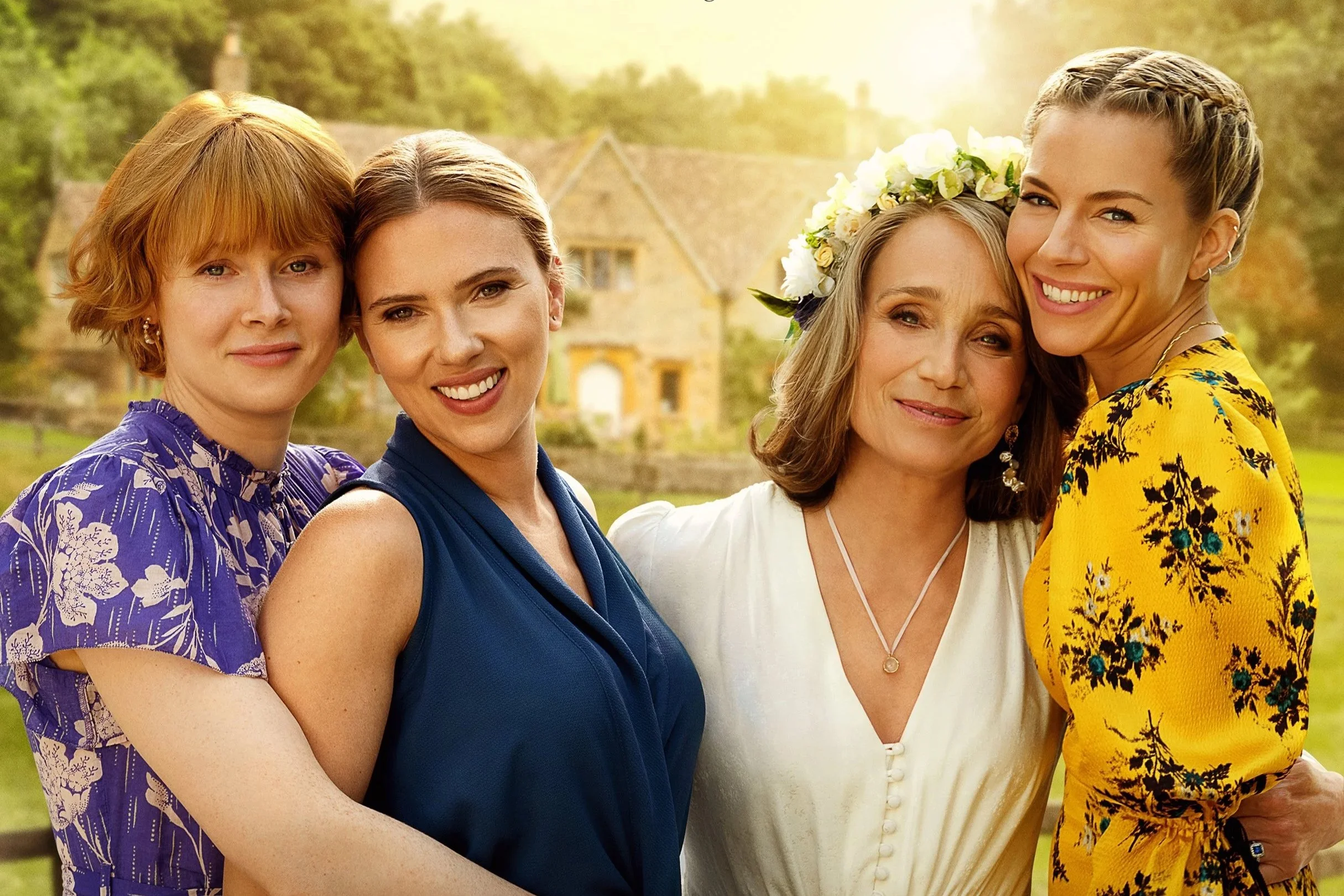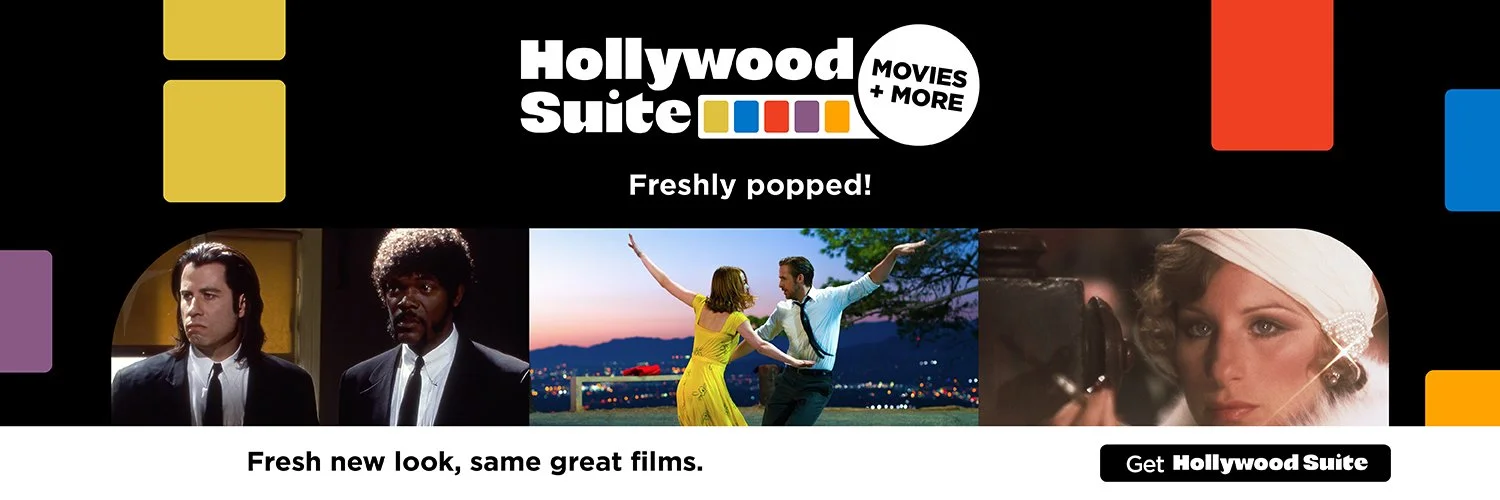Original-Cin Q&A: Director/writer/co-star Kristin Scott Thomas on My Mother's Wedding
By Bonnie Laufer
Kristin Scott Thomas has been playing attention-getting roles for decades. The Oscar-nominated actress (The English Patient) now takes a turn behind the camera with her directorial debut of her very personal film, My Mother's Wedding,
She also co-wrote the screenplay and stars as the matriarch of three sisters who return to their childhood home for the third wedding of their twice-widowed mother. Over the weekend, the family gathers to celebrate the new marriage, but mother and daughters are forced to revisit the past and confront the future.
Bonnie Laufer spoke with Kristin Scott Thomas about why it was time to share this deeply personal story and take the reins as a director.
My Mother’s Wedding is in theatres on August 8. Read our review of the film.
Emily Beecham, Scarlett Johansson, Kristin Scott Thomas and Sienna Miller
O-C: The film had its premiere here at the Toronto International Film Festival in 2023. You've been here before with movies that you've starred in, but what was it like to present a film that you directed?
KRISTIN SCOTT THOMAS: Well, unfortunately, I couldn't present it because there was a big writers strike, and I had to stay locked in my hotel room.
O-C: Oh my goodness, that is right. That sucks!
SCOTT THOMAS: It was deeply frustrating but what can you do? I love coming to the Toronto Film Festival. It's a really fun time.
O-C: Well, you know what? You'll have to just direct another film and then bring it here. So promise me that.
SCOTT THOMAS: Okay, alright then. I’m on it!
O-C: My Mother’s Wedding is a very personal film and journey for you. You co-wrote it with your husband (Bloomberg News editor-in-chief John Micklethwait) and it was many years in the making. Why was this the right time for you to decide you were going to step behind the camera?
SCOTT THOMAS: Well, as you say I've been wanting to do it for a while and never really found the right project. I felt that it was finally time to claim my story.
It was a story of this sort of tragic childhood element of my biography that had been told many times in profiles that had been done in my career.
I just felt it was time to claim it as mine, and to explore relationships in families, to explore grief in families, to have a look at what it's like to be a mother who is in love, and all these sort of complicated issues that us women have to deal with all the time.
O-C: This all started when you were a young girl. You have been a storyteller since when you were a child as you loved to draw and tell stories through those drawings. You’ve used that in this film to depict the main character’s childhood memories which was so effective.
SCOTT THOMAS: The illustrations were made by an Iranian named Reza Riahi, who is a very talented animator. I'd seen his work before, and I'd wanted to capture elements of my memory, so that I would be able to share that with my siblings.
I have lots of siblings, and none of them have memories of my father, or they have fewer memories because I was the eldest. I was almost six when he was killed, and then I was 11 when my stepfather was killed and I wanted to kind of preserve that.
I wanted to give them something to hang their hats on and share what I remembered. From there, that became an idea for a movie, an invented story about these three women who are wrestling with their romantic disarray, with their noses slightly out of joint, because their mother is so deliriously happy.
O-C How dare she!
SCOTT THOMAS: How dare she indeed! Right? (Laughs) And she's chosen a man who they're not quite sure about, who they feel is a disappointment. They think he is a let-down after these heroic men that they consider their fathers to be, these incredible sort of godlike creatures in their minds.
Of course they thought this was because they had so little when they were taken away from them. They only had stories and pictures to go by. So no one could live up to these heroes.
O-C: What's so fascinating to me, is that everybody has a different memory of things or situations. When you look back at something siblings might have experienced for example, we all look at it in a different way.
In this film the memories are so specific, and we see this through Scarlett Johansson who plays the eldest sibling Katherine, the character closest to playing you in the film. She has vague memories of her father as we see through the illustrations, but he has no face. That’s so sad.
SCOTT THOMAS: Well, because I think that as you say, memory is different for everybody. It's never quite the real thing. So you're always grasping for something.
You're trying to find the lost element and the lost element in this case is obviously her father' s life. I felt that it was more powerful when you don't see the eyes, there's something missing. You're constantly looking for that, for the life in the face. And we don't see that because the memory can’t process that.
O-C: You cast Scarlett Johansson, Sienna Miller, and Emily Beecham to play your daughters. They are all wonderful in these roles, but you have a special place in your heart for Scarlett. She's not British but this is the third time that she's played your daughter on screen. What was it like to have her play Katherine?
SCOTT THOMAS: She's a wonderful actress. She can turn on a sixpence, as we say in English. But she really is so talented and so dedicated and such a team player.
I admire and respect her so much because she turned up. It's a little film and she was right in there with everyone. She created such a great atmosphere around the three women in the story. These three young women became so close, it was really lovely to watch, actually.
But Scarlett is somebody I've known since she was a little girl, because we did The Horse Whisperer together. I played her mother in that, and then later we did a film called The Other Boleyn Girl, where she was also my daughter.
And so I've sort of seen her in her teens, in her 20s, and now in her late 30s, and it was such a joy and such a privilege to have her trust as well. I mean, she's been around the block a couple of times. She knows what's what, and the fact that she trusted me with this project was just great.
O-C: I’ve got to say, she wears that Navy uniform really well.
SCOTT THOMAS: I know she looked amazing in it. I want one like that.
O-C: After this whole process, the writing, the directing everything that you've gone through to present this to us, was it a cathartic experience? Did you feel any different after it was all over and now that the world is going to see this?
SCOTT THOMAS: To be honest it really wasn’t cathartic in a personal way because these are all things that I've been dealing with for a very long time.
I'm an actress and one of the things that I became successful at, and was employed for, was to play these characters who had a slight sort of mysterious sadness to them that would then be revealed. I think I've been carrying that for a very long time.
So it wasn't cathartic in that sense. I will admit that it was a huge challenge to be in charge of so many things and it was a much steeper learning curve than I'd anticipated.
Being on set for me is second nature. I love it, and I'm at my happiest on a film set. But then there was editing, and the editing was where I really learned so much. I sort of wish I could have done it the other way around, been an editor, and then taken on directing.
It really was an extraordinary learning curve that I enjoyed tremendously with moments of huge doubt and terror. In the end, it’s given me such joy and satisfaction and pleasure at seeing people watch the film and seeing how audiences are responding to it. It’s given me a lot more confidence in areas that I didn’t know I needed.
O-C: Having had the opportunity to work with some pretty fine directors over the course of your career, was there anyone in particular who influenced your own directing style?
SCOTT THOMAS: I don't think so. I think these things sort of sink in without you really noticing. I certainly think that I was possibly more influenced by my French cinema experience than others, because we're talking about a family.
It's a very kind of intimate subject. These little tiny details in children's lives that then become huge, great weights when they become an adult. You know, the sort of secrets that they carry around and things. So yeah, I think perhaps I was more influenced by my French language films than any of the really great directors that I've worked with.”



